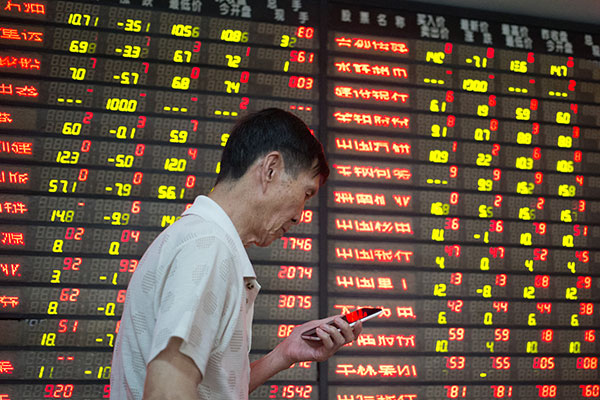 |
|
An investor at a brokerage in Nanjing, capital of Jiangsu province. The Shanghai Composite Index fell by 1.1 percent on Aug 3. [Su Yang/China Daily] |
Risks from program trading are hurting stock market stability
China's securities regulator has widened efforts to stem the stock market slide by investigating the speculative program trading blamed for the surging market volatility.
The move came as the A-share market continued to decline with shrinking turnover and greater volatility amid investors' renewed fears for a second dip after the dramatic sell-off has slashed the benchmark index by some 30 percent since mid-June.
The Shanghai Composite Index fell by 1.1 percent on Monday while the ChiNext index that tracks high-growth start-up companies on the Shenzhen bourse fell by 5.5 percent.
Nearly 500 stocks in Shanghai and Shenzhen tumbled by the 10 percent trading limit. The surge of blue-chip banking shares during afternoon trading helped lift the benchmark index to close above 3,600 points.
The China Securities Regulatory Commission has turned its attention to automated program trading, a type of trading strategy that utilizes computer programs to execute buy and sell orders based on predetermined conditions.
"Trading irregularities in some stock accounts combined with the risks amplified by program trading have seriously hurt the market stability," the CSRC said in a statement.
The securities watchdog said that it has found abnormal and speculative trading that is suspected of having used program trading to distort share prices and mislead investors to make profits.
While program trading remains a niche strategy employed by hedge funds and private equity firms, it has drawn growing concerns over its impact on market volatility as the advance of technology and easier access to electronic exchanges offer investors more sophisticated trading tools to play the market.
The CSRC's ongoing investigation has also reminded many of the panic "flash crash" of the US stock markets in 2010 that dived 600 points and rebounded in 20 minutes. The volatility was caused by a British trader quickly placing and canceling orders, a practice known as "spoofing" to reap profits.
On Monday, the Shanghai Stock Exchange said that it restricted trading of four stock accounts during intra-day trading as they were suspected of disrupting market order by frequent orders and cancellations.
The Shanghai and Shenzhen exchanges have imposed curbs on 24 trading accounts for such trading irregularities.
But some experts expressed doubts over the effectiveness of the regulator's move to prevent a market meltdown.
Dong Dengxin, head of the finance and securities research institute at Wuhan University of Science and Technology, said that program trading may be made a scapegoat for the recent market volatility.
"Institutional investors often use program trading to 'sail through' the abnormal market fluctuations, which objectively is a mechanism that reduces market volatility," he said.
